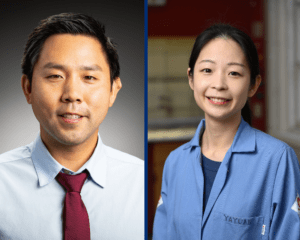Researchers at Johns Hopkins’ Whiting School of Engineering (WSE) and the Johns Hopkins Applied Physics Laboratory (JHUAPL) are working to create lithium-ion batteries capable of functioning in some of the world’s coldest environments.

Jesse Ko and Yayuan Liu
The effort is being led by Jesse Ko, a senior staff scientist at JHUAPL, and Yayuan Liu, an assistant professor in WSE’s Department of Chemical and Biomolecular Engineering (ChemBE) and an associate researcher at the Ralph O’Connor Sustainable Energy Institute (ROSEI). The group has received funding for four years from the Office of Naval Research (ONR) through its Navy Undersea Research Program (NURP).
“Climate change creates new challenges in the Arctic, and if you go inland there, temperatures can reach -40 to -75 degrees Fahrenheit. Current battery technology simply won’t operate at those temperatures,” Ko said. “If you send a soldier or drone out there, you want the equipment to function as it should.”
Current lithium-ion battery technology doesn’t work in frigid temperatures because its liquid electrolyte component, which flows back and forth between the anode and cathode to facilitate the electric charge, freezes, rendering the battery inoperable.
To mitigate this, the researchers are investigating the use of various combinations of solvents that would create disorder—called “entropy”—in the electrolyte, reducing its freezing point and ensuring the battery’s performance in frigid conditions. Entropy does this by disrupting the orderly arrangement of molecules in the liquid, making it more challenging for them to organize into a solid, frozen structure.
“As long as we are increasing the entropy into the electrolyte in a controlled manner, we are going to be able to make the freezing point for it go lower and lower,” Ko said. “We will be investigating what combinations of solvents make sense, but what makes this tricky is that it’s almost an infinite number of combinations.”
Finding the right combination of solvents using human trial and error is extremely time-consuming; in fact, it took multiple decades to discover the chemical makeup of the electrolytes used in current lithium-ion batteries.
To speed up this timeline, the group will use high-throughput experimentation, AI robot-controlled electrochemistry, and machine learning (ML) to determine entropy-generating factors more quickly.
“We’ll collect a lot of data with high throughput experimentation, then use that data and feed it to a ML algorithm to help us find ideal conditions for creating entropy in the electrolyte without doing human trial and error. This will accelerate the process tremendously,” Liu said.
The researchers also hope to achieve lab automation with this work.
“The idea is we’ll do an experiment with the robot, feed the results to the ML model, and then that model will process, learn the data, and provide feedback to the robot on what combinations might work better. This creates a loop and should further accelerate the material discovery process,” Liu said.
Ko’s team’s ML and prototyping expertise will be used to assess the potential effectiveness of the options proposed by Liu’s group for improving entropy at lower temperatures.
“ROSEI has done a great job of bringing together faculty at Hopkins whose research focus is in the sustainable energy area,” Ko said. “This has made it a lot easier for us at JHUAPL to find collaborations with researchers that have the right expertise, which is so crucial for doing impactful research.”
